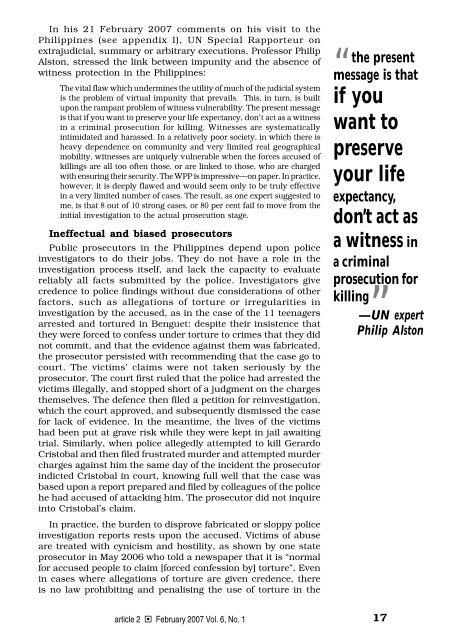of the Philippines the criminal justice system is - Article 2
of the Philippines the criminal justice system is - Article 2
of the Philippines the criminal justice system is - Article 2
Create successful ePaper yourself
Turn your PDF publications into a flip-book with our unique Google optimized e-Paper software.
In h<strong>is</strong> 21 February 2007 comments on h<strong>is</strong> v<strong>is</strong>it to <strong>the</strong><br />
<strong>Philippines</strong> (see appendix I), UN Special Rapporteur on<br />
extrajudicial, summary or arbitrary executions, Pr<strong>of</strong>essor Philip<br />
Alston, stressed <strong>the</strong> link between impunity and <strong>the</strong> absence <strong>of</strong><br />
witness protection in <strong>the</strong> <strong>Philippines</strong>:<br />
The vital flaw which undermines <strong>the</strong> utility <strong>of</strong> much <strong>of</strong> <strong>the</strong> judicial <strong>system</strong><br />
<strong>is</strong> <strong>the</strong> problem <strong>of</strong> virtual impunity that prevails. Th<strong>is</strong>, in turn, <strong>is</strong> built<br />
upon <strong>the</strong> rampant problem <strong>of</strong> witness vulnerability. The present message<br />
<strong>is</strong> that if you want to preserve your life expectancy, don’t act as a witness<br />
in a <strong>criminal</strong> prosecution for killing. Witnesses are <strong>system</strong>atically<br />
intimidated and harassed. In a relatively poor society, in which <strong>the</strong>re <strong>is</strong><br />
heavy dependence on community and very limited real geographical<br />
mobility, witnesses are uniquely vulnerable when <strong>the</strong> forces accused <strong>of</strong><br />
killings are all too <strong>of</strong>ten those, or are linked to those, who are charged<br />
with ensuring <strong>the</strong>ir security. The WPP <strong>is</strong> impressive—on paper. In practice,<br />
however, it <strong>is</strong> deeply flawed and would seem only to be truly effective<br />
in a very limited number <strong>of</strong> cases. The result, as one expert suggested to<br />
me, <strong>is</strong> that 8 out <strong>of</strong> 10 strong cases, or 80 per cent fail to move from <strong>the</strong><br />
initial investigation to <strong>the</strong> actual prosecution stage.<br />
Ineffectual and biased prosecutors<br />
Public prosecutors in <strong>the</strong> <strong>Philippines</strong> depend upon police<br />
investigators to do <strong>the</strong>ir jobs. They do not have a role in <strong>the</strong><br />
investigation process itself, and lack <strong>the</strong> capacity to evaluate<br />
reliably all facts submitted by <strong>the</strong> police. Investigators give<br />
credence to police findings without due considerations <strong>of</strong> o<strong>the</strong>r<br />
factors, such as allegations <strong>of</strong> torture or irregularities in<br />
investigation by <strong>the</strong> accused, as in <strong>the</strong> case <strong>of</strong> <strong>the</strong> 11 teenagers<br />
arrested and tortured in Benguet: despite <strong>the</strong>ir ins<strong>is</strong>tence that<br />
<strong>the</strong>y were forced to confess under torture to crimes that <strong>the</strong>y did<br />
not commit, and that <strong>the</strong> evidence against <strong>the</strong>m was fabricated,<br />
<strong>the</strong> prosecutor pers<strong>is</strong>ted with recommending that <strong>the</strong> case go to<br />
court. The victims’ claims were not taken seriously by <strong>the</strong><br />
prosecutor. The court first ruled that <strong>the</strong> police had arrested <strong>the</strong><br />
victims illegally, and stopped short <strong>of</strong> a judgment on <strong>the</strong> charges<br />
<strong>the</strong>mselves. The defence <strong>the</strong>n filed a petition for reinvestigation,<br />
which <strong>the</strong> court approved, and subsequently d<strong>is</strong>m<strong>is</strong>sed <strong>the</strong> case<br />
for lack <strong>of</strong> evidence. In <strong>the</strong> meantime, <strong>the</strong> lives <strong>of</strong> <strong>the</strong> victims<br />
had been put at grave r<strong>is</strong>k while <strong>the</strong>y were kept in jail awaiting<br />
trial. Similarly, when police allegedly attempted to kill Gerardo<br />
Cr<strong>is</strong>tobal and <strong>the</strong>n filed frustrated murder and attempted murder<br />
charges against him <strong>the</strong> same day <strong>of</strong> <strong>the</strong> incident <strong>the</strong> prosecutor<br />
indicted Cr<strong>is</strong>tobal in court, knowing full well that <strong>the</strong> case was<br />
based upon a report prepared and filed by colleagues <strong>of</strong> <strong>the</strong> police<br />
he had accused <strong>of</strong> attacking him. The prosecutor did not inquire<br />
into Cr<strong>is</strong>tobal’s claim.<br />
In practice, <strong>the</strong> burden to d<strong>is</strong>prove fabricated or sloppy police<br />
investigation reports rests upon <strong>the</strong> accused. Victims <strong>of</strong> abuse<br />
are treated with cynic<strong>is</strong>m and hostility, as shown by one state<br />
prosecutor in May 2006 who told a newspaper that it <strong>is</strong> “normal<br />
for accused people to claim [forced confession by] torture”. Even<br />
in cases where allegations <strong>of</strong> torture are given credence, <strong>the</strong>re<br />
<strong>is</strong> no law prohibiting and penal<strong>is</strong>ing <strong>the</strong> use <strong>of</strong> torture in <strong>the</strong><br />
“<br />
<strong>the</strong> present<br />
message <strong>is</strong> that<br />
if you<br />
want to<br />
preserve<br />
your life<br />
expectancy,<br />
don’t act as<br />
a witness in<br />
a <strong>criminal</strong><br />
prosecution for<br />
killing<br />
”<br />
—UN expert<br />
Philip Alston<br />
article 2 • February 2007 Vol. 6, No. 1 17

















